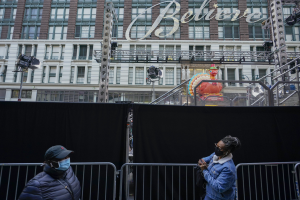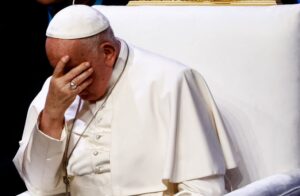The democratic recession is so severe that autocrats now openly stage coups, steal elections, and invade other countries.
ladimir Putin has stopped pretending. For months, the Russian president had claimed that he was merely interested in the security of his nation. For months, he had assured the world that he was interested in a diplomatic solution. For months, he had ridiculed warnings about an impending Russian invasion of Ukraine.
Then he ordered a full-scale attack on a sovereign nation. Russian missiles blew up targets in key cities including Kyiv, Lviv, and Kharkiv. Russian troops rapidly advanced into Ukrainian territory. War has returned to the heart of Europe.
Though Putin insisted that Russia was merely carrying out a “special military operation,” he clearly intended the world to hear his message. The global order that had emerged after the fall of the Soviet Union is a thing of the past. Putin no longer intends to let even the most basic international norms—like the prohibition on territorial conquest by military means—limit his ambitions.
We stand at the beginning of a new era of naked power politics.
The attack on Ukraine coincided with the long-planned publication of a Freedom House report on the state of democracy in the world. As this year’s report went live on the organization’s website, just after midnight this morning, CNN was showing live pictures of Russian troops advancing across the border and billowing towers of smoke rising above major Ukrainian cities.
Based on meticulous monitoring of developments in every corner of the globe, Freedom House finds that the world has entered the 16th consecutive year of what the political scientist Larry Diamond has termed a “democratic recession.” In 2021, the number of countries moving away from democracy once again exceeded the number of countries moving toward it by a big margin.
Democratic institutions and civil rights deteriorated in 60 countries, with Afghanistan, Nicaragua, Tunisia, and Sudan experiencing especially precipitous declines. At the beginning of the democratic recession, about half of the world’s population lived in a country classified as “free.” Now only two out of every 10 people do, while four in 10 live in “partly free” nations like India, and another four in 10 live in “unfree” nations like Saudi Arabia.
As in the past few years, countries whose democratic institutions political scientists had once considered “consolidated”—meaning that they were thought to be extremely unlikely to collapse in the foreseeable future—showed real signs of weakness and instability. Six days into 2021, for instance, an assault on the U.S. Capitol disrupted the peaceful transfer of power in the United States, which had long been regarded as the prototypical consolidated democracy.
The most interesting findings of the report help give crucial context to the tragic events unfolding in Eastern Europe. For just as Russia’s apparent plans to annex parts of Ukraine are an especially flagrant violation of international law, so too assaults on democracy have over the past year grown much more brazen. With democracy in crisis around the globe, its enemies no longer feel a need to hide their autocratic ambitions.
During the Cold War, plenty of democratic governments were destroyed at the barrel of a gun, as the enemies of democracy openly embraced the use of political violence. Over the past few decades, however, aspiring dictators generally came to power through the ballot box, winning (relatively) free and fair elections. Only then did they start to concentrate power in their own hands, undermining independent institutions and curtailing free expression to such an extent that they could no longer be removed from office by democratic means.
In the mid-aughts, the number of countries experiencing democratic backsliding was high, but the number of military coups remained low. In 2021, by contrast, the number of coups jumped to seven, the highest since 2000. Military officers in countries including Myanmar, Sudan, and Mali used force to install their favored political leaders in high office over the course of the past year.
The weakening of democratic norms is also allowing presidents and prime ministers who are already in office to act more ruthlessly. In the immediate post–Cold War period, even dictators felt the need to worship at the altar of democracy. Political leaders routinely went to great lengths to maintain the illusion of enjoying democratic legitimacy. Though these professions of democratic faith were never sincere, they did create an incentive for authoritarian regimes not to oppress opposition activists or ordinary citizens in the most overt and brutal ways. But that’s now changing.
For example, although the Russian opposition has long operated under extremely difficult—and dangerous—conditions, some parties that were genuinely critical of Putin could at times present themselves for election. This was not the case in 2021, when Alexei Navalny and many of his supporters were jailed in the run-up to parliamentary elections and his party was barred from the ballot.
And in this year’s elections in Nicaragua, to cite another example, the Sandinista leaders arrested a number of opposition candidates on spurious charges. “Elections, even when critically flawed, have long given authoritarian leaders a veneer of legitimacy, both at home and abroad,” Sarah Repucci and Amy Slipowitz of Freedom House write. “As international norms shift in the direction of autocracy, however, these exercises in democratic theater have become increasingly farcical.”
Another depressing facet of the Freedom House report is that the number of countries experiencing improvements in their democratic institutions has fallen radically of late. In 2006, the first year of the democratic recession, 56 countries moved toward greater freedom and democracy. Last year, only 25 did.
In the United States and much of Western Europe, the current crisis is mostly about what political scientists call “democratic backsliding”: the weakening of democratic institutions in countries that have long enjoyed them. But around the globe, the most striking aspect of the current moment may be “democratic despondency”: The number of countries aspiring to democracy has fallen to a record low.
At the end of the Cold War, all signs pointed in the direction of democracy. People around the world aspired to live the American dream—to experience the affluence portrayed in Hollywood movies as well as the freedoms enshrined in the Bill of Rights. Other Western democracies looked stable and successful, inspiring citizens of other countries who sought to be well governed to fight for a democracy of their own. And the United States was the world’s only superpower, limiting the geopolitical ambitions of dictators, and even providing them with an incentive to rule with a gloved fist.
The changes of the past three decades have fundamentally reduced the appeal of democracy. Those who are primarily interested in material wealth can now aspire to live in affluent autocracies such as China or the United Arab Emirates; for many citizens of the world’s poorest countries, the dream of living the good life is no longer synonymous with the dream of living in a democratic country. Many democracies are now rife with acrid divisions and face domestic challenges to their stability; this strain on democratic institutions is especially pronounced in the United States. And the power of the democratic world is being challenged by a rising China and a revanchist Russia; the world’s dictators can turn to resurgent authoritarian regimes for economic investments, military supplies, and international legitimacy.
All of this helps explain why the world’s dictators are taking off their masks. Autocratic leaders from Myanmar to Nicaragua no longer feel constrained by the need to maintain some semblance of democratic legitimacy or appease the State Department. And those dictators, like Vladimir Putin, who also have significant military might at their disposal are now trying to remake the world order in their image.
As Russian troops advance toward Kyiv, democracy is no longer the only game on the global stage. And so the coming decades won’t just pit democracies against autocracies in key territorial battlegrounds like Ukraine. They will also pit the defenders of democracy against those who blatantly reject the supposed decadence of popular self-determination in the sphere of ideas.
Even more of The Atlantic insight you love, at the tap of your fingers.




